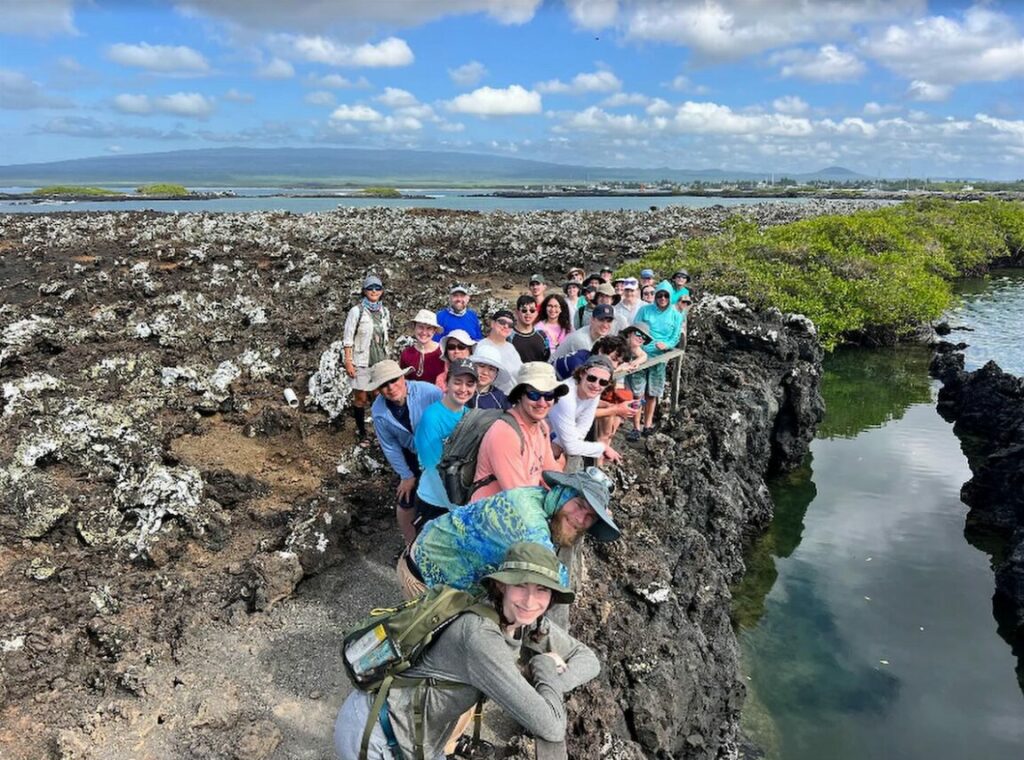State of Emergency confronts UMW students in Ecuador
4 min read
“Ecology and Evolution in the Galapagos Island” students traveled to Ecuador during spring break. | Photo Courtesy of Ben Schwartz.
by CLAIRE WATKINS
Staff Writer
Over UMW’s spring break from March 2–10, approximately 30 students enrolled in the “Ecology and Evolution in the Galapagos Islands” class brought their research beyond the classroom and onto the islands. Considering Ecuador’s state of emergency, some students hesitated to embark on the trip, and their return was delayed on the way back to the United States.
According to the U.S. Embassy and Consulate in Ecuador, President of Ecuador Daniel Noboa announced a 60-day national state of emergency on Jan. 8. The announcement came immediately following the prison escape of José Adolfo “Fito” Macías Villamar, leader of Los Choneros gang. While the group was in the Galapagos Islands on March 7, Noboa announced a 30-day extension of the national state of emergency he established earlier in the year.
Professor of biological sciences Andrew Dolby and Michael Stebar, senior lecturer of biological sciences, led the group to the Galapagos Islands. During their stay, students followed the curriculum without disruption from the national state of emergency.
Leaders and participants monitored travel advisories, State Department alerts and communication with the Center for International Education for weeks before, as well as during their trip.
Leading up to departure, Lillian Burbulis, a sophomore biology major, wondered if the travel advisory would force UMW to cancel the study abroad program. She followed Ecuadorian news for months before spring break and communicated with her peers weekly leading up to their trip.
“As soon as the spring semester started, that was one of the first things that we were asking about and talking about,” said Burbulis. Students received an email from the State Advisory Board about the state of emergency, and CIE staff communicated updates with Dolby and Stebar.
“We were all aware of the fact that there would be a possibility that we might just have to pull the plug on this trip,” said Burbulis. “Luckily, we didn’t have to, but everybody was aware of the situation [and] that it was changing every day, and so every week we’d give each other updates.”
Dolby was in contact with operators in Ecuador, and the group had a guide with them at all times. Additionally, because the Galapagos Islands are not a part of the mainland, the group did not have a curfew by which they needed to abide. On the mainland, the group was briefly in Guayaquil—the closest major city to the Galapagos—where they participated in an excursion.
“Everything looked like business as usual where we actually went on the mainland, which was just a quick trip from the hotel for dinner down near a historic site, where the government buildings are,” said Dolby. “It was a Saturday night– you know, kids playing in the playground, street performances going on. So it was a really happy, active evening, just like normal. And that downtown area, it’s kind of like the equivalent of going to the National Mall area in D.C., where it’s always pretty much fine to go.”
Burbulis said she found a relaxed environment when she arrived in the Galapagos along with the group.
“Although it’s an Ecuadorian territory, it’s kind of its own world,” said Burbulis. “So we did not experience much of the conflict at all, because we were in an area that was completely conflict-free—from a tourist perspective.”
Kate Green, a junior conservation biology major said, “One of the first days that we were there, we took a boat out to Isla Lobos, which is off San Cristobal. We looked at a lot of birds on our way out to the island.”
Because of the concerns about the Avian flu—a contagious bird flu, caused by the influenza virus—tourists were not allowed to hike on the island.
“We just kind of boated around the whole island and then snorkeled in the water near it, looking at all the fish,” Green said.
Nonetheless, students were still able to engage with the culture and local businesses, according to Green.
“After snorkeling, we took a boat to another beach where we spent a little bit and then had the afternoon largely free to explore the island and engage with the culture and support local economy and local businesses,” she said.
On March 10, however, the flight meant to take the group from Guayaquil, Ecuador to Miami, Fla. around noon did not arrive until the evening. Although synchronous, the extended national state of emergency in Ecuador did not affect the delay of the aircraft from Miami but rather a crew issue, said Sarah Moran, the study abroad coordinator for CIE.
“We ended up being delayed three or four hours, so we were in the Guayaquil airport for something along the lines of seven,” said Green.


